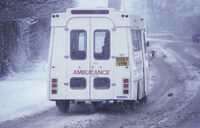 The Met Office is warning of the first winter weather for the UK. Mel Harrowsmith, Head of Civil Contingencies at the Met Office, said "For many, the weather during this week is likely to be the first experience of colder wintry weather, with either frost, wintry showers or even snow affecting many areas of the UK."
The Met Office is warning of the first winter weather for the UK. Mel Harrowsmith, Head of Civil Contingencies at the Met Office, said "For many, the weather during this week is likely to be the first experience of colder wintry weather, with either frost, wintry showers or even snow affecting many areas of the UK."
It is important to be ready for the changing weather, the floods have already taken a heavy toll recently but the cold weather kills many people every year.
Research has found that prolonged exposure to moderately cold temperatures kills more people than extreme heat or freezing spells. Looking at data collected in 384 locations across Australia, Brazil, Canada, China, Italy, Japan, South Korea, Spain, Sweden, Taiwan, Thailand, UK, and USA, researchers have identified that the majority of these deaths actually happen on moderately hot and cold days, with moderately cold temperatures causing the most of all.
Dr Angie Bone of Public Health England (PHE) points out that "Over the past few weeks we've had some very disruptive weather, but temperatures have been quite mild - now the weather will be colder over much of the country, which will be a significant change."
How can we protect ourselves and others from the cold?
Dr Bone highlights the advice from PHE:
- Think about how cold weather may affect your friends and family - particularly if they are older, very young or have pre-existing health conditions.
- If you, or they, are eligible for a flu vaccination make sure you get it as soon as you can.
- When indoors, have plenty of warm food and drinks.
- Try to maintain indoor temperatures to at least 18°C, particularly if you have to sit still for long periods, have a long term illness or are 65 or over.
The Red Cross advises that we have an emergency kit with a range of essentials in it, their site details the kit to have at home, when out and about and items to keep in your car. These items range from a list of emergency contact details to bottled water and ready-to-eat food.
What about driving?
Most of us need to carry on driving in the cold winter weather and RoSPA points out that you can adapt the way you drive, to stay safe: "Different weather conditions create different hazards throughout the winter and in different areas of the country at different times. A single journey may take us into very different weather, road and traffic conditions, so we need to be prepared for each one." RoSPA goes on to detail how to:
- Prepare your vehicle
- Prepare your journey
- Prepare yourself
- Drive in snow or ice
- Drive in rain
- Drive in fog
- Drive in strong winds
- Drive in low sunshine
As well as emergency kit, how else can we stay safe at home in the cold weather?
With the cold weather setting in, many households will be relying on gas boilers and gas fires to stay warm. This increased usage can put pressure on gas appliances and could lead to them breaking down when they are needed most.
It’s vital that everyone has their gas appliances regularly serviced and safety checked every year to prepare them for the cold winter months. This will help reduce any risk of carbon monoxide poisoning - a simple battery operated detector is also recommended.
The Gas Safe Register has previously reported that more than 5.5 million people in the UK are putting their health and finances at risk by not getting their gas appliances safety checked every year, this has led to the equivalent of 186 gas emergency call outs, every day, to homes in the UK.
If you are one of these people, find a Gas Safe registered engineer to test your appliances now! If you have a solid fuel burning system for heating your home (including wood burners or an open coal fire) don't forget to have your chimney swept at least once each year - you can find an approved sweep on the HETAS website.
So, keep safe this winter and don't forget to keep an eye out for those friends, family and neighbours who may need a little help when the weather turns cold.
Author bio
Marcus Butcher is a health and safety adviser with an environmental health background.